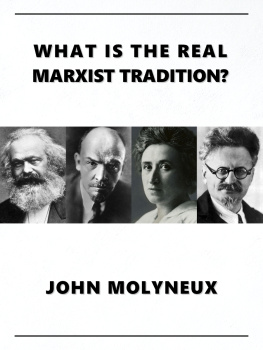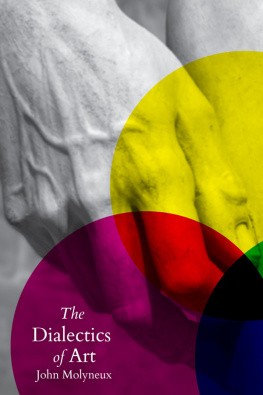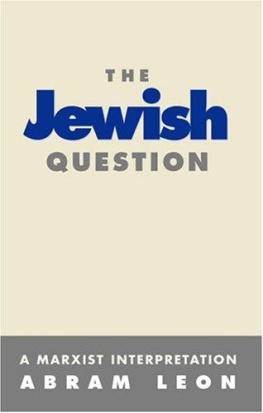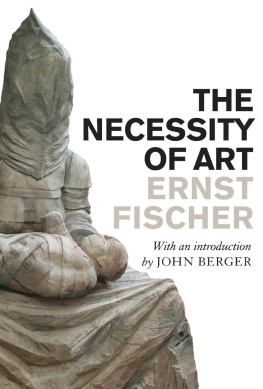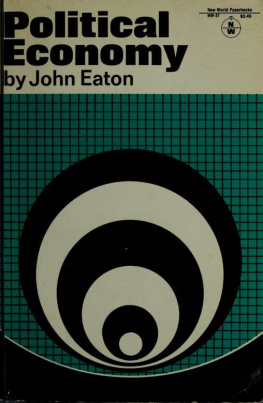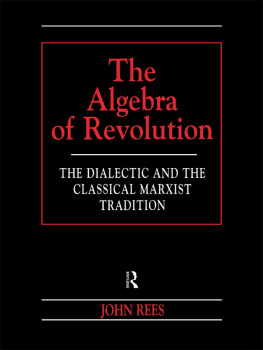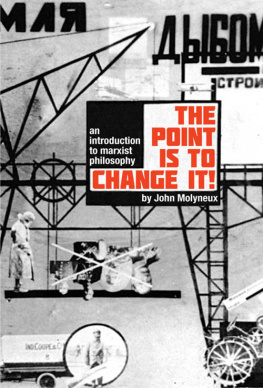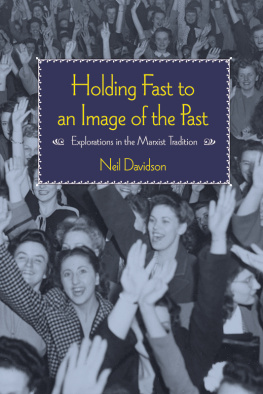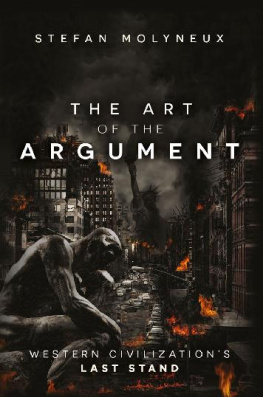John Molyneux - What is the Real Marxist Tradition?
Here you can read online John Molyneux - What is the Real Marxist Tradition? full text of the book (entire story) in english for free. Download pdf and epub, get meaning, cover and reviews about this ebook. year: 2020, publisher: Marxists Internet Archive, genre: Politics. Description of the work, (preface) as well as reviews are available. Best literature library LitArk.com created for fans of good reading and offers a wide selection of genres:
Romance novel
Science fiction
Adventure
Detective
Science
History
Home and family
Prose
Art
Politics
Computer
Non-fiction
Religion
Business
Children
Humor
Choose a favorite category and find really read worthwhile books. Enjoy immersion in the world of imagination, feel the emotions of the characters or learn something new for yourself, make an fascinating discovery.
- Book:What is the Real Marxist Tradition?
- Author:
- Publisher:Marxists Internet Archive
- Genre:
- Year:2020
- Rating:3 / 5
- Favourites:Add to favourites
- Your mark:
- 60
- 1
- 2
- 3
- 4
- 5
What is the Real Marxist Tradition?: summary, description and annotation
We offer to read an annotation, description, summary or preface (depends on what the author of the book "What is the Real Marxist Tradition?" wrote himself). If you haven't found the necessary information about the book — write in the comments, we will try to find it.
What is the Real Marxist Tradition? — read online for free the complete book (whole text) full work
Below is the text of the book, divided by pages. System saving the place of the last page read, allows you to conveniently read the book "What is the Real Marxist Tradition?" online for free, without having to search again every time where you left off. Put a bookmark, and you can go to the page where you finished reading at any time.
Font size:
Interval:
Bookmark:
Originally published in International Socialism 2:20, July 1983
Published in book form, Bookmarks, London, 1985
Originally published in International Socialism 2:20, July 1983
Published in book form in February 1985 by Bookmarks, London
Downloaded with thanks from the Marxisme Online Website
Transcribed and marked up by Einde O Callaghan for the Encyclopaedia of Trotskyism On-Line (ETOL)
Converted to ebook format June 2020
Cover photographs: L-R: Marx, Lenin, Luxemburg, Trotsky
Wikimedia Commons
At the time of ebook conversion this title was available in hardcopy from Haymarket Books:
https://www.haymarketbooks.org/books/806-what-is-the-real-marxist-tradition/
What is Marxism?
As in private life one distinguishes between what a man thinks and says of himself and what he really is and does, still more in historical struggles must one distinguish the phrases and fancies of the parties from their real organism and their real interests, their conception of themselves from their reality.
- Karl Marx, The 18th Brumaire of Louis Bonaparte
All I know, said Marx, is that Im not a Marxist. What in the 1870s was a neat dialectical joke has since been transformed into a major political problem. The one hundred years since Marxs death have seen the emergence of innumerable divergent and conflicting Marxisms. The centenary of that death seems an appropriate moment to attempt to untangle this particular knot, to establish the criteria for accepting claims to the title of Marxism and thus to answer the question What is the genuine Marxist tradition? But first let us be clear about the dimensions of the problem.
It is not just that people who call themselves Marxists hold different views on certain questions (say the tendency of the rate of profit to fall or the class nature of the Soviet Union): that is something to be expected in any living democratic movement. The real problem is that frequently the Marxists are to be found imprisoning, killing, and making war on each other, and, more fundamentally, that in all the great social conflicts of our age self-proclaimed Marxists are to be found on opposing sides of the revolutionary barricades. Think of Plekhanov and Lenin in 1917, of Kautsky and Luxemburg in 1919, of the Communists and the POUM in Barcelona in 1936, of Hungary in 1956 and of Poland in 1981. It is this which compels us to pose the question of what defines Marxism.
There are, of course, some who would reject the question altogether, denying that the search for a true Marxism has any meaning and simply accepting as Marxist all those who claim the label. On the one hand this is a convenient response for the bourgeoisie and its cruder ideologists, in that it permits them to condemn all Marxism and Marxists by association with Joe Stalin and Pol Pot, the butcher of Cambodia. On the other hand it also suits the academic Marxologists, enabling them to produce numerous profitable guides to the Marxists, offering cribs to every school of thought from the Austro-Marxists to the Althusserians.
Such an approach is essentially contemplative. Action, especially political action, requires decisiveness in theory as well as practice. Marxists who want to change the world, not just to make a living from interpreting it, have no choice but to face the problem and to draw a dividing line between the genuine and the false.
One way of trying to draw such a dividing line might be to identify Marxism with the works of Marx and to measure the followers simply by their faithfulness to the word of the master. Again this is a scholastic, even religious, approach. It fails to take account of the fact that if Marxism is, as Engels said, not a dogma, but a guide to action, then it must be a living, developing theory, capable of continuous growth, which has to analyse and respond to an ever changing reality a reality which has in fact changed enormously since Marxs day. Even if, for historical reasons, we name the theory after the individual who did most to establish it, we cannot, at the price of total impotence, reduce or confine it to what that individual himself wrote. As Trotsky observed, Marxism is above all a method of analysis not analysis of texts but analysis of social relations.
This quotation from Trotsky points in the direction of an alternative solution to the problem one adopted by Hungarian Marxist George Lukacs. In History and Class Consciousness Lukacs asked What is Orthodox Marxism? and answered as follows:
Orthodox Marxism does not imply the uncritical acceptance of the results of Marxs investigations. It is not the belief in this or that thesis, nor the exegesis of a sacred book. On the contrary, orthodoxy refers exclusively to method.
This is a much more serious proposal in that it takes account of the need for development, and it contains an important element of truth in that the dialectical method is without doubt central to Marxism. Nonetheless it is inadequate as a solution to our problem. It is not possible to establish such a rigid demarcation between Marxs method and his other analyses, nor to reduce the essential contents of Marxism solely to method. This is shown by the very example Lukacs gives to illustrate his proposition.
Let us assume [writes Lukacs] for the sake of argument that recent research had disproved once and for all every one of Marxs individual theses. Even if this were to be proved, every serious orthodox Marxist would still be able to accept all such modern findings without reservation and hence dismiss all of Marxs theses in toto without having to renounce his orthodoxy for a single moment.
Quite the contrary is the case. If, for example, in defiance of Marxs whole analysis of the dynamic of capitalist development, capitalism were to evolve into a new form of world bureaucratic society without internal competition and contradictions, which precluded the possibility of either socialism or barbarism, then Marxism would clearly be refuted, and the proponents of such a perspective Max Weber, Bruno Rizzi and James Burnham would be vindicated. As Trotsky concluded when considering this hypothetical perspective, nothing else would remain except only to recognise that the socialist programme, based on the internal contradictions of capitalist society, ended as a Utopia.
What the foregoing argument might seem to suggest is that Marxism should be defined as a method combined with certain essential analyses and propositions. But this apparent solution in reality only pushes the problem one stage back. By what criterion can it be decided which analyses and propositions are fundamental and which are secondary? Moreover such an approach bears with it the danger of theoretical sectarianism, of defining Marxism as the correct line on everything, and so arriving at the position that Luxemburg was not a Marxist when she disagreed with Lenin about the party, that Lenin was not a Marxist when he maintained the bourgeois nature of the Russian Revolution, and so on.
How then can we break out of this circle? Not by first seeking to extract from Marxs work certain theses, but by using Marxist theory to view Marxism as a totality.
For Marx It is not social consciousness that determines social being, but social being that determines social consciousness. Consequently the understanding and definition of any philosophy, theory, or ideology is first and foremost a matter of disclosing the social being that constitutes its foundation.
Thus Marx treats religion in general as the self-consciousness and self-awareness of man who either has not yet attained to himself or has already lost himself again.
Font size:
Interval:
Bookmark:
Similar books «What is the Real Marxist Tradition?»
Look at similar books to What is the Real Marxist Tradition?. We have selected literature similar in name and meaning in the hope of providing readers with more options to find new, interesting, not yet read works.
Discussion, reviews of the book What is the Real Marxist Tradition? and just readers' own opinions. Leave your comments, write what you think about the work, its meaning or the main characters. Specify what exactly you liked and what you didn't like, and why you think so.

